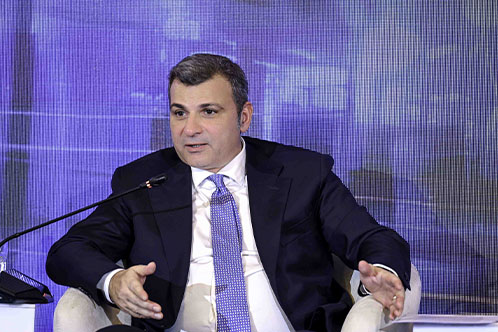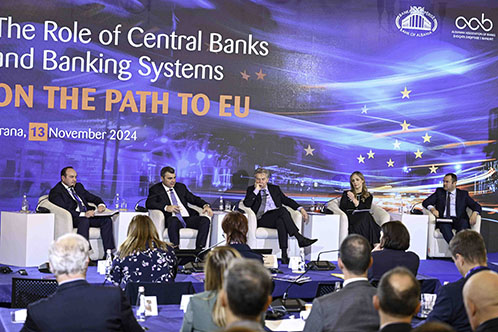BANK OF ALBANIA
PRESS RELEASE
Bank of Albania Annual Conference 2024: Conclusions
Publication date: 13.11.2024
The Annual Conference of the Bank of Albania “Role of central banks and banking systems on the path to EU”, co-hosted with the Albanian Association of Banks, closed its proceedings. The conference focused on central banks and banking system on their path to the European Union, the present and future reforms and challenges to be undertaken by them and other actors in the market, with a view to turn this process and the convergence to the EU, the most efficient and at the lowest costs to all economic agents, financial system and the economy.

Organised in three sessions, the outlook of central banks and other international actors, in terms of monetary policy and financial stability, were addressed in the proceedings of the first and second sessions. Governors’ Roundtable brought together in the last panel the governor’s views and opinions along with a summary of respective institutional reforms that central banks should undertake in terms of inflation, growth objectives and convergence on the path to EU.

The first session addressed the outlook of central banks in terms of their adoption to the legal and regulatory aspects also in terms of monetary and banking supervision policies, by preserving price stability and financial stability, in turn the macroeconomic stability of the country. The experience of other countries, like Hungary and Croatia, has proven that the path to EU, is not an easy process and demands for the maximum commitment of all institutions. Central banks, but not only, should be prepared to react in a mature and coordinated manner on the consequences originating in the economy from the first round effects, also those of the second round. These effects will demand for an adaptation of the monetary policy approach and a strengthening of banking supervision in order to have an economy that is as resilient and stable as possible, to shocks from the large capital inflows that are expected in the economy, impacts on the exchange rate, management of foreign exchange reserves, real estate prices, investments in them and the impact they may have on credit and credit risk. On the other hand, countries must continue their structural reforms to enhance productivity, digitalization, education and financial literacy, as well as the development of an economic model that ensures a long-term sustainable economic growth.

In case of the Albanian economy, assessments show that we have made progress in terms of price stability, as well as in terms of financial and macroeconomic stability as a whole. Significant positive developments have taken place over the last two decades, both in terms of structural and cyclical convergence, where the Bank of Albania has played a key role in managing exchange rate shocks, increasing and strengthening banking supervision and stability, minimizing losses in the economy, as well as improving the well-being of the entire economy. The EU remains our strategic, financial and economic partner hence adherence in the EU needs more engagement. Banks and the financial system play a primary role in this process, towards a more resilient and stable financial system, where the challenges for the future are quite strong.

The second session focused on digital transformation and related aspects affecting the financial system, the access, use, and distribution of financial products and services. The Western Balkans have a lot of potential in terms of financial digitization, so they should be prepared to make the best employment of them. This will require that all financial intermediaries, mainly banks, adapt to this migration towards digitalization, at the fasted pace as possible and with maximum efficiency.

The Bank of Albania, during this period, has provided a positive contribution in terms of improving financial inclusion, reducing the use of cash in the economy, as well as its high costs. The strategies and all the work done by the Bank of Albania have driven to an increased financial inclusion, enhanced financial development and the shifting to another level of development. SEPA is a positive opportunity for the banking system, also mostly for households and businesses.

The future is expected to trigger many challenges regarding personal data protection, cyber risks, and their management. We live in a world when everything is changing: consumer and business’ preferences are changing, hence giving rise to an altered risk profile of banks.

In this perspective, central banks must be avant-garde, provide their best practices, and react to changes, having monitoring and consistent objectives, to ensure as much resilience against expected and unexpected macroeconomic shocks. Special importance should be given to the cultural risk, which requires a communication and explanation of actions and policies undertaken, for an improved financial literacy and inclusion, aimed at strengthening both price and financial stability.

The Closing Panel with the Governors’ Roundtable focused on the institutional strategies and outlook of the regional central banks in terms of price stability objective, the challenges they have faced, such as the Covid-19 pandemic, the war in Ukraine, as well as the increased geopolitical uncertainties that continue to be present in the global environment. Governors provided an overview on the current situation of the convergence process towards the EU and the alternatives for its acceleration.

Structural factors seem to remain a concern, with human capital, productivity and innovation and technological development requiring special focus. The ageing of the population and its migration continue to be very important structural factors that should receive enhance attention.

At the conclusion of the conferee, the Governor stated that: “Central banks on the path to EU should enhance capacity building, improve digitalisation, and enhance financial intermediation, as an important contribution in economy. They should not be alone in this path; all institutions should be strengthened to ensure a faster convergence.”
Cyber risks, digitalisation, innovation and climate change continue to remain the next challenges for the years to come. Financial system, for addressing these challenges, should invest more in improving financial literacy and digital financial literacy.
The EU remains our strategic, financial and economic partner hence adherence in the EU needs more engagement.
The monetary policy framework based on inflation targeting and on a flexible exchange rate remains a necessary and a valuable structure on the path to EU.
Bank of Albania has made considerable progress in harmonising the regulations of our banking sector with the respective EU Acquis-aimed at promoting the sustainability of financial stability and its protection against external shocks.
The future poses new challenges, with totally different nature, which require a complete and coordinated institutional engagement. Thus, we together - the banking system, the other national and international institutions - should work hand in hand with a view to accomplish our duties in successfully managing the future challenges.

 Linkedin
Linkedin
 Twitter
Twitter
 Facebook
Facebook
 Instagram
Instagram
 Flickr
Flickr
 RSS
RSS
 Subscribe
Subscribe
 Feedback
Feedback